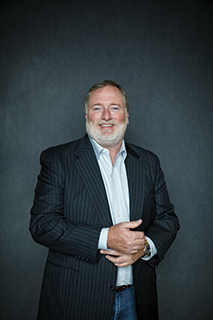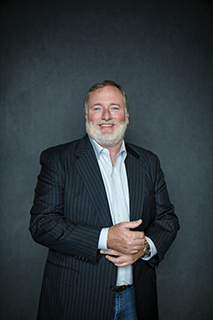

CEO of the Year: Tim Miller
Gigi Sukin //December 1, 2013//
 Nobody fetches coffee for the chief executive officer at Rally Software. It’s not that kind of place, and Tim Miller is not that kind of guy.
Nobody fetches coffee for the chief executive officer at Rally Software. It’s not that kind of place, and Tim Miller is not that kind of guy.
Miller fills his own cup, then chats about his favorite roast with co-workers in the break room at Rally, a Boulder-based business that’s booming.
In April, Rally’s IPO raised more than $90 million and the company plans for a nearly 90,000 square-foot expansion in the next two years. Its culture has earned it local and national accolades as a “Best Place to Work,” including from ColoradoBiz.
Miller has had a banner year and a career to write home about as well, with more than a decade spent changing the way businesses build software and products.
The 2013 ColoradoBiz CEO of the Year, considered a “servant leader” among his internal team, embraces collaboration and trust and encourages members of his team to chase their dreams – just as he chased his.
Miller followed his brother to the University of Colorado-Boulder in 1981, pursuing a passion for mountain powder unavailable in his hometown of Cincinnati. He reveled in the university’s non-academic offerings, such as his fraternity.
“I probably loved Phi Kappa Psi a little too much,” he said with a chuckle. Indeed, after failing out of school and attending night school in an attempt to bring up his GPA, he left Colorado to pursue real estate in Arizona. He later enrolled at Arizona State University to acquire an MBA.
“I had a baby girl and realized that I had to grow up pretty quick,” he says. “Plus, I really loved finance.”
Miller returned to CU in 1990 to further his studies, starting out in a Ph.D. program in finance before changing course and earning a second master’s in Management Science and Information Systems.
“I had always loved computers and wanted to learn how to program them and use them in business,” Miller says.
In 1990, while studying the latest waves in technology development, he met future business partner Ryan Martens. The pair completed research on what is presently referred to as Agile software development, a term that crops up with virtually every reference to Rally.
The Manifesto for Agile Software Development, published in 2001 by a gaggle of techies, not including Miller, is as follows:
“Individuals and interactions over processes and tools; Working software over comprehensive documentation; Customer collaboration over contract negotiation; Responding to change over following a plan.”
“This became the basis for what our company is built on,” Miller said.
In a 2012 Fast Company magazine article, the self-proclaimed introvert recommended: “Evolve or die … Agile is so much more than a marketing buzzword or something developers do with their headphones on in their cubicles. It’s a way of working that represents the future of innovation. The ability to make a decision, trace it down to the execution level and deliver relentlessly in short, iterative bursts will make things happen faster.”
But back in the early 1990s, Miller confronted many naysayers.
“I had some 500 conversations with business people who said the Internet would never be anything, that it was purely academic. But I was patient.”
Sure, when the 51-year-old CEO was just starting out, the Internet had a “What’s New” page that listed the two or three latest tweaks or additions to the Web, and not much else. But, “It was a wonderful time to cut our teeth,” Miller says.
In 1995, he presented a business plan to his employers at a small Colorado-based consulting firm where he and Martens worked for more than three years. He offered them a 50 percent stake in his company concept in exchange for a full year’s salary. They turned him down.
So the next day, Miller quit.
“I was terrified,” he recalls. “I think every entrepreneur is terrified.”
Miller and Martens went on to build their first startup, Avitek, which grew to a 40-person, $10 million custom software development firm acquired by BEA Systems in 1999. After the BEA buyout, which he called “unsatisfying with no sense of legacy,” Miller remained with his company until 2001 before taking a breather.
He, his wife and two daughters set sail across the Caribbean and Mediterranean seas for the next year and a half. While on the open water, he received a business plan from Martens for F4 Technologies, which later became Rally.
“I told him it was a stupid idea,” Miller says. “That was the last time that Ryan got really mad at me. We’ve only had two or three fights in the 25 years we’ve known each other.”
When Miller returned to dry land in 2003, he became year-old Rally’s CEO.
In its 11 years, Rally has served more than 192,000 users, including 36 Fortune 100 companies. It has become an award-winning software vendor, with a platform and products aimed at assisting companies to drive corporate strategies, govern development lifecycles and extend collaboration company-wide.
{pagebreak}
At the heart of its technology is the Agile coding technique, which improves the speed of development and enhances quality.
“Software is where all the innovation is happening,” Miller says.
According to International Data Corporation (IDC) figures, the application lifecycle market (ALM), which includes software configuration management, IT projects, portfolio management and automated software quality, was estimated at $5.4 billion in 2012; the software market in its entirety totals more than $372 billion, according to information technology research and advisory company, Gartner, as of 2011.
Miller admits there have been some obstacles to overcome.
“Probably the biggest was around the time of our third round of financing,” in 2008, he says. “We were very confident in the business. We had taken on some debt and hired very aggressively. We found out that our investors didn’t want to do the financing: We were told we’re ‘all steak and no sizzle.’”
As a result, it looked as if they would have to lay off about 50 employees.
“But we licked our wounds and found someone else the next week that could do the financing,” Miller says. “Lo and behold, we were able to continue on our growth curve as previously estimated.”
Miller says building the business in Colorado has meant the company’s efforts had to be “that much better than if they were a Bay Area company,” especially when on the hunt for funding. “We are a company of substance … I believe we always will be.”
Rally has been charging down the IPO path for about two years, timed to what the CEO hoped would be a receptive market.
“From my perspective, we were exceptionally well-prepared,” Miller says. “We really had no surprises.”
In the several months post-IPO, Miller says his job hasn’t changed dramatically. “We’ve always had a responsibility to our shareholders because we were funded by private equity since day one.”
Beyond the headquarters expansion, Rally sees aggressive hiring on the horizon to grow its 400-person global team, as well as a significant uptick in the Denver business.
Miller’s ongoing attentiveness to make Rally an outstanding company from the inside-out has been awarded with local and national honors, including: Best Company to Work For nods in ColoradoBiz 2006 through 2010 and again last year, Fortune magazine’s No. 8 Great Place to Work (Best Medium-Sized Workplaces) in 2012; Wall Street Journal’s “Next Big Thing” of Top Venture-Backed Companies twice in 2011 and 2012, and four separate Best Place to Work listings in Outside magazine.
“Tim and the culture are what attracted me here,” says Liz Andora, Rally’s VP of People – a position found under “human resources” at most companies. But Rally isn’t most companies according to Andora, who made the move more than two years ago after spending the bulk of her career in tech giants such as Hewlett Packard and Sun Microsystems.
“It’s an intense culture,” Andora says of her work environment and its team-based ethic. “If you’re someone who doesn’t want to work on a team or who has a hero mentality, it would be hard here.”
Though Rally’s write-ups regularly reference work-life balance and perks, such as unlimited sick days, available Razor scooters and free on-site Friday yoga classes, “People want to do well and work hard here,” Andora says.
“Everyone balances differently,” Miller adds. To achieve personal balance, the CEO says he tries to take a vacation about once a quarter. Mirroring Miller’s periodic breaks from the office, Rally started a sabbatical program in 2010, which grants employees who’ve been with the company seven years or more a six-week, fully paid leave to “do something bold and grand.”
Andora says Miller’s servant leadership style defines Rally’s core culture and ability to maintain highly efficient, collaborative teams.
“It’s not about command and control,” Andora says. “In Monday morning management meetings, [Tim] is not front and center. He tends to sit back thoughtfully and listen. He’ll challenge people and he’s very analytical. But he encourages others and does not point fingers. If there were a problem or a mistake, a lot of executives want one throat to choke, but Tim asks, ‘How did we find ourselves here?’ He really tries to create a learning organization.”
Miller’s support for innovation, collaboration, transparency and individual empowerment seems to work for Rally.
“When Ryan and I first started working together, I wanted to create a great, big company, and Ryan wanted to create a great product and raise capital,” Miller says. “My goals have always been to grow the company fast, build a great culture and support our great customers.”
As of September, Rally had achieved year-over-year quarterly growth of 42 percent, 38 percent, 24 percent and 45 percent in the past four consecutive quarters. The company’s stock price has nearly doubled since its IPO, with a recent market cap in the range of $600 million. This fall, after its quiet post-public period, Rally delivered on its founding promise with 1 percent of its founding equity pledged to the Entrepreneurs Foundation of Colorado (EFCO) and a donation of 22,396 shares to its own Rally for Impact Foundation, with a $655,108 yield.
The numbers are adding up in Rally’s favor, but Miller seems even more proud of his ability to create a people-centric environment.
“I want the bright, ambitious people that make up Rally to create their own reality,” he says. “Really, it is about empowering our team to take risks – to do interesting things that they’re passionate about.”
______________________________
Now in its ninth year, the ColoradoBiz CEO of the Year award seeks to recognize outstanding professional achievement and community impact while taking into account obstacles surmounted, career-long body of work or other unique elements
of the CEO’s life and work.
Nominations from Colorado’s business community, ColoradoBiz readers and staff are evaluated by a judging panel made up of the magazine’s editorial board.
CEO of the Year winners
2005 – Jeff Potter, Frontier Airlines
2006 – Marc Katz, Mercury Payment Systems
2007 – Steve Ells, Chipotle Mexican Grill
2008 – Kim Jordan, New Belgium Brewing Co.
2009 – Mark and Annie Danielson, Danielson Designs
2010 – Mike Gilliland, Sunflower Farmers Markets
2011 – John Horan, Horan & McConaty
2012 – Steve Bartolin, The Broadmoor
2013 – Tim Miller, Rally Software


























